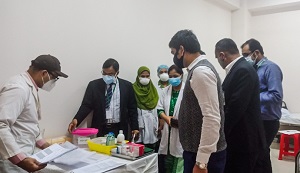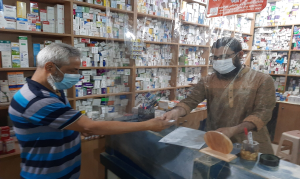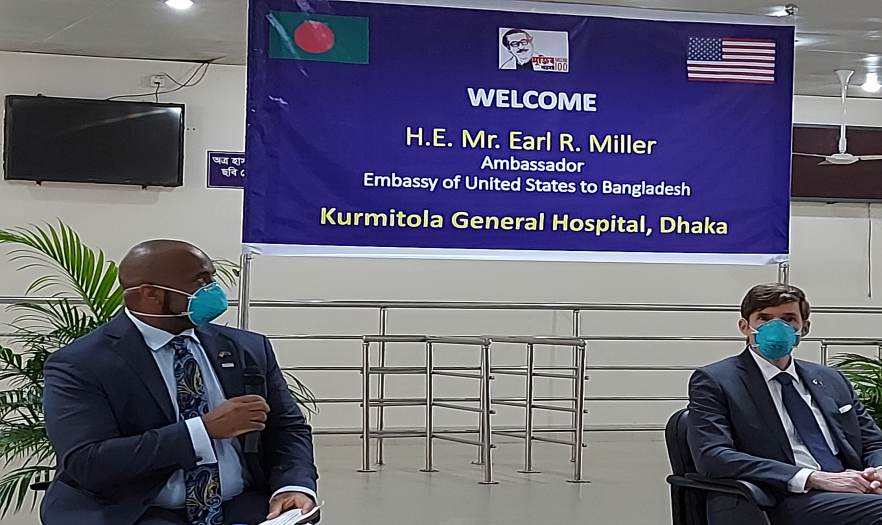Country Landscape and MTaPS’ Support
In Bangladesh, the first reported COVID-19 cases were in March 2020. At the onset of the pandemic, the country was not adequately prepared to contain the virus with health facilities ill-equipped to handle an influx of COVID-19 patients and segregation of COVID and non-COVID patients and weak capacity of health workers in infection prevention and control (IPC), waste management, and the use of personal protective equipment (PPE)—the essentials for an epidemic response; PPE was also in short supply. As part of rapid pandemic response, USAID MTaPS assisted the Ministry of Health and Family Welfare’s Directorate General of Health Services (DGHS)—the agency leading the country’s pandemic response—with rolling out a national action plan focusing on building health workers’ IPC capacity and strengthening supply chain logistics management for emergency commodities.
Currently, MTaPS is supporting Bangladesh’s effort to vaccinate its population of 119.2 million against COVID-19, which is 70% of its total population. Approximately 35.5% of its people are fully vaccinated against COVID-19 as of January 2022. MTaPS is working with the Directorate General of Drug Administration (DGDA) to introduce systems for active surveillance for COVID-19 vaccine safety and real time reporting of adverse events following immunization (AEFI) relating to COVID-19 vaccines—a focus area that is critical to address vaccine hesitancy and ensure a successful immunization program.
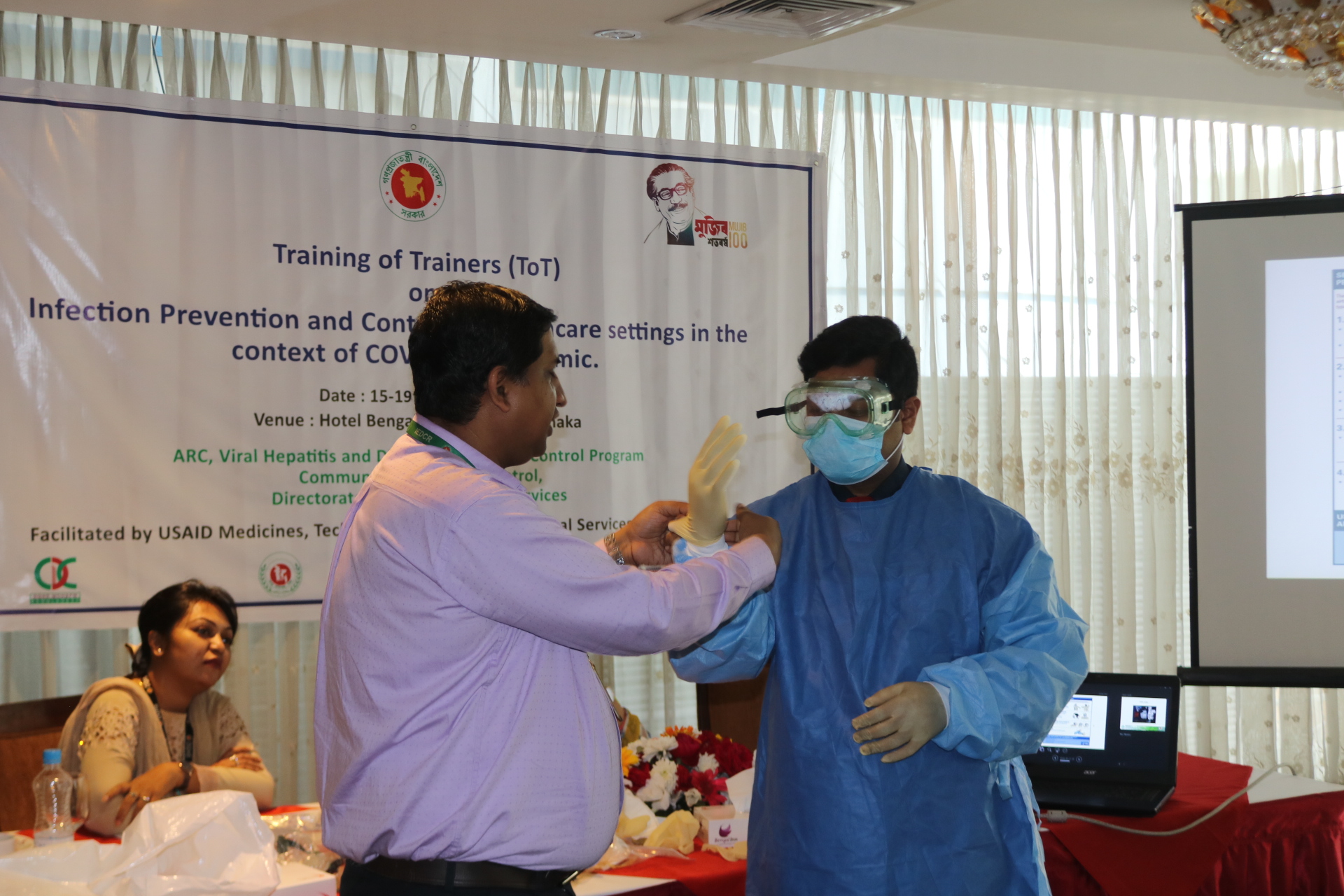
Trainer showing how to wear a PPE in a training-of-trainer program in Bangladesh. Photo credit: MTaPS Bangladesh
Select Highlights
Infection Prevention and Control (IPC)
- Developed COVID-19 specific guidelines on IPC for healthcare settings, training materials, and videos and job aids for health workers
- Delivered a training-of-trainers program to create master trainers at COVID-19 designated health facilities to quickly cascade down IPC training to health care providers
- Reached thousands of health workers, cleaners, and ambulance drivers as part of health care workforce, with virtual and in-person training on IPC practices (including triage, PPE use, early infection recognition and source control, sterilization, and disinfection)
- Produced short videos in local language on the pandemic do’s and don’ts, screened in patient waiting areas at hospitals and upazila health complexes to raise awareness
Indicators as of September 2023

5101
Number of workers trained on
COVID-19-related IPC and/or WASH

1275
Number of health facilities supported for IPC and/or WASH for COVID-19

6
Number of COVID-19 e-learning modules developed
Emergency Supply Chain Management
- Developed and rolled out a COVID-19 electronic logistics information management system (eLMIS) to quickly enable DGHS monitor stock status of emergency commodities in real time, across all pharmacies and drug stores. Timely stock information accessible by the directorate, policymakers, suppliers, and donors, allowed for effective coordination, avoiding stock outs during the peak of the pandemic in 2020. (Read full story)
- Trained 430 health care workers from 126 health facilities countrywide to fully operationalize and hand over the COVID-19 eLMIS to DGHS’ Management Information Systems unit
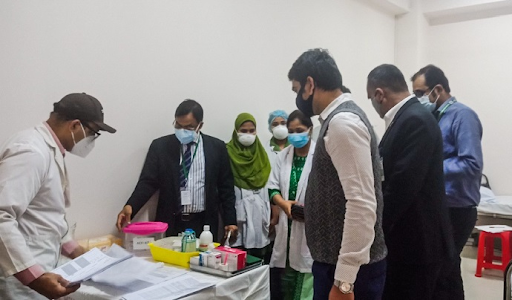
DGDA staff, along with MTaPS team, examining the preparedness of COVID-19 vaccination center for patient management
Photo credit: MTaPS Bangladesh
COVID-19 Vaccine Deployment and Pharmacovigilance
- Assisted setting up a national COVID-19 vaccine safety surveillance system in collaboration with the DGDA to monitor and respond to AEFIs, which is helping ensure patient safety and build public confidence in the COVID-19 vaccine (read more). Results include:
- An online AEFI reporting system for COVID-19 vaccines
- Active safety surveillance protocol for COVID-19 vaccines
- 1000+ staff trained on pharmacovigilance and AEFI reporting
- More than 4,500 AEFI reports submitted to national AEFI monitoring system, as of March 2023
- Communication of vaccination safety data to multi-sectoral stakeholders

3
Number of COVID-19 vaccine multisectoral
coordination mechanisms that meet regularly
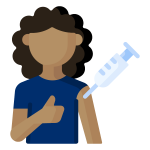
4508
Number of adverse event following immunization (AEFI) reports reviewed with MTaPS support
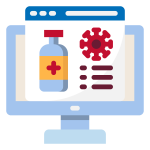
483
Number of people trained on COVID-19 vaccine-related topics
Partners include:
- Directorate General of Health Services
- Directorate General of Drug Administration
- Institute of Epidemiology, Disease Control and Research
- Expanded Program on Immunization, Maternal, Neonatal, Child, and Adolescent Health
- Johns Hopkins University
- UNICEF
- WHO
- The World Food Programme
- The Food and Agriculture Organization
